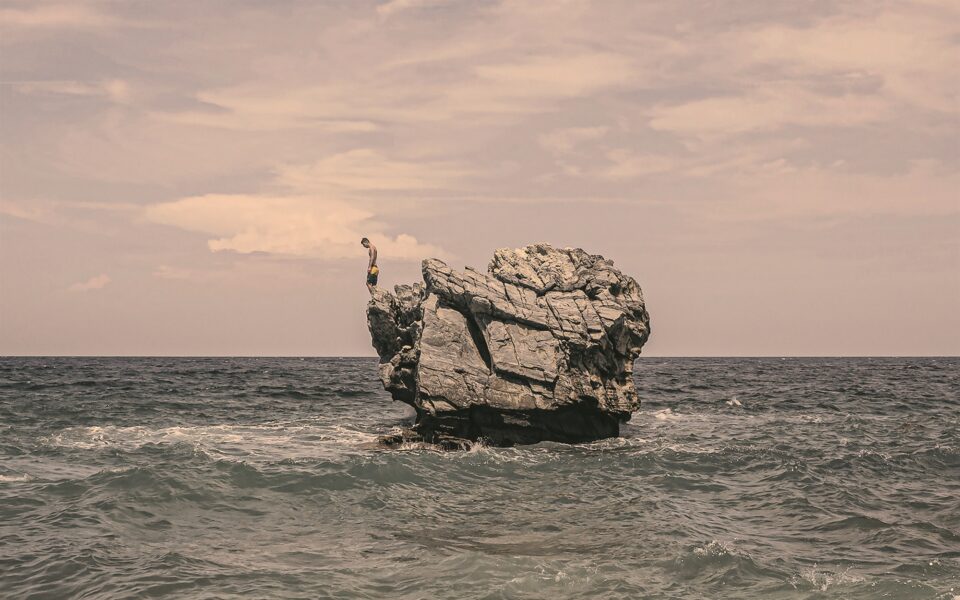Greece without a summer?

A visit to the Cycladic islands provides ample evidence of the incredible increase in tourism. Athens is also feeling the change, with more than 16,000 visitors heading up to the Acropolis alone every day. Never have we seen so many direct flights from the United States or global celebrities singing the country’s praises. And after a two-year slump brought on by the pandemic, 2019’s arrivals record looks set to be broken: Estimates for August point to more than a million visitors a week and the crowing has already begun, as though we had a hand in this success. So, everything in the garden rosy, right?
Not quite. As Alexis Papachelas recently noted in his commentary “The ‘party’ has started again” (August 3), the tourism surge also brings serious problems, especially for the islands: from unfettered construction, terrible traffic and problems with water supply and sewerage, to piles of garbage and woeful shortcomings in infrastructure. Ills, in other words, stemming from “overtourism.” But it is not just the burden on destinations; it is also the negative impact on the tourism product itself and potentially on the country’s “brand name.” It is a classic case of the “tragedy of the commons,” the shortsighted overexploitation of resources leading to their depletion and the demise of those who depend on them for a living. This is not, of course, a domestic problem but one affecting all the world’s popular destinations. In places like Barcelona or Venice, for example, local reactions are mounting, and restrictions being imposed.
In the meantime, how infrastructure is managed is also changing. It’s similar to the case with cars: Developing their infrastructure only results in increased use. Building a modern airport on a Cycladic island may make it easier to reach, but it also multiplies visitor numbers, putting additional pressure on its infrastructure. Basically, the philosophy of maximizing arrivals no longer makes sense. Huge tourist numbers will soon be seen in a negative light, as we start to embrace a different approach based on managing tourism flows and possibly restricting them.
The transformation
I don’t know whether these observations sound bizarre. What I do know is that they are yesterday’s news, as a much profounder transformation of the tourism model, a true paradigm shift, is taking place, with mass tourism being replaced by high-income, VIP tourism.
This transformation is apparent, not on Mykonos, but on islands with a completely different reputation, such as Naxos, Milos or Tinos, where land sales have exploded, as have their prices. Thousands of building permits are being issued and the mansions going up are a far cry from the modest holiday homes and “villa” compounds of the recent past. We’re talking about impressive structures of an innovative, minimalist design, mansions hewn into the contours of the natural landscape and massive, hacienda-style houses with gardens. Most of Greece’s top architectural firms have turned almost exclusively to this market, which is also attracting top European architects. Their clients belong to the ranks of the very wealthy, those with homes in Paris, Zurich, Los Angeles and New York. It is a phenomenon that is spreading across the Aegean, the Ionian and the Peloponnese, but also to Greece’s mountains, such as in Epirus. Services are also adapting accordingly, and an entirely new ecosystem has emerged, consisting of “villa managers,” private chefs, “animateurs,” private tutors and carers for children, chauffeurs etc. Traditional tavernas, meanwhile, are being replaced by fine-dining restaurants as horiatiki salad is replaced by ceviche. Even the language is changing as more foreign words creep into the vernacular.
Recent statistical data paints a vivid picture. Visitor expenditure is up this year by around 9% compared to the past. Four- and five-star hotels and luxury short-term rentals are doing booming business. In contrast, lower-caliber lodgings and less attractive destinations are stagnating. It is, in other words, a structural shift toward higher income brackets. Recognizing the trend, major foreign investment funds abroad are snapping up dated and overindebted hotels to transform them into something much more luxurious, while a similar explosion is also being seen in demand for luxury home rentals.
The VIP push
The most telling piece of data, however, is the leap in private jet arrivals. In the first seven months of 2022 they shot up 40% against the record-breaking year of 2019 at Athens International Airport (AIA) and the 14 regional airports managed by Fraport. AIA handled 8,149 private flights in this period compared to 4,866 in January-July 2019, a jump of 67%. Together, these 15 airports welcomed more than 14,000 private flights by the end of July; that’s three flights an hour for every day of the week. The number is even higher if you add other airports such as those in Iraklio, Crete, and Kalamata in the southern Peloponnese, and that is not to mention private helicopter flights, which came to more than 2,500 at the landing pad in Spata, east of Athens, in January-July. Room is even being sought at military airstrips because civilian ones are having trouble coping. A jet set indeed!
So, why is this development important? Given that “luxury tourism” seemed like an untenable dream until recently, the development could be hailed as positive, especially to the degree that it edges out mass tourism. It can also be argued that this newly evolving class of foreign homeowners will push demands for better infrastructure and services that are in line with the caliber of their investment.
However, the main effect of this phenomenon is that it is slowly pushing out low- and middle-income earners from the more popular destinations. And that is something we care about – a lot. The more VIP tourism expands, the faster ordinary people lose the ability to afford a holiday by the sea.
The more VIP tourism expands, the faster ordinary people lose the ability to afford a holiday by the sea
This became evident this summer, and it’s not just because of inflation. Most Greeks can no longer afford the cost of traveling to or staying and eating at the country’s premier destinations. Even a simple trip to the beach is evolving into a costly consumer product with the dramatic expansion of the sunbed culture gradually but inevitably transforming the country’s coastline into an expensive (and often tacky) club-restaurant. It’s easy to see the shift from cheap refreshment trucks and flimsy loungers to luxurious beach bar-restaurants with huge, bed-like loungers or exclusive beach clubs charging the corresponding prices.
Those who cannot or will not pay will perforce move to more affordable (and likely less attractive) destinations and more and more people will lose the ability to keep up with the VIP tourism transformation. Greece has a lengthy coastline, but it’s not infinite.
Comparative advantage
Critics will argue that the ability to offer luxury and exclusivity is our comparative advantage and we should charge for it as long as demand lasts. And that demand for our tourism product is potentially huge, even if we haven’t realized it yet. Greece may not be the most beautiful country in the world as we so often like to boast, though it is a boast that is not completely devoid of truth. The combination of landscape, sea and climate you find in Greece is a rare and extremely desirable commodity on an increasingly wealthy planet.
Of course, there is a counterargument to the counterargument too. To begin with, a country is more than its landscape; it’s its people and its culture. And the transformation of a large part of the country into a product stripped of its humanity is a catastrophe. What’s more, the “Greek summer” is not just a catchphrase. It is so much more for Greeks; it is something elemental and profound, connecting us to our childhoods, homelands and forebears.
Indeed, how many Greeks of my generation have not relished the experience of weeks-long holidays at pristine beaches on a tiny budget? The summer is, basically, what defines us, as economist Aristos Doxiadis so aptly argued in a piece for Kathimerini in 2013: “Summer is something some people buy and others have as a birthright. We Greeks belong in the latter category.” He adds that going on vacation is a choice provided by the global tourism industry for the people of the West, but for Greeks in cities, summer holidays are “not a service we pay for, but a return to our own, parallel life… Summer is our second home. For many, this is quite literally true thanks to widespread small-scale property ownership. But even others who stay at hotels or rented rooms know exactly what they’re looking for: a beach, some fishing, a hike, a taverna or a beach bar.”
The cost
It’s a description that may seen dated today. And this is because our special relationship with the summer, which emerged with the country’s urbanization half a century ago, is already waning as we bequeath not just a massive pile of debt to subsequent generations, but also a Greece without summer holidays.
The toll is not just psychological. It has specific economic ramifications. The replacement of an environment rich in the human element with the sterilized culture of a resort exclusively for the rich leads to the loss of another massive comparative advantage that could prove a game changer for the country. As I argue in my book “The Greek Dream,” for example, our ability to attract innovative individuals to live and work in Greece relies exclusively on them having access to a unique way of life, a key component of which is the Greek summer. If this access is lost, so is this prospect.
I am afraid that the path we’re on is irreversible. Just as the poverty-stricken Cyclades of the 1950s became the tourism engine we all know today, so they will soon be transformed into a VIP mecca. Is there anything we can do about it? This is not the place to discuss possible solutions. These obviously do not lie in a romantic and often excessive longing for a past that is gone. Managing this new reality demands a well-targeted and smart public policy, something that is hard but by no means impossible. But this, in turn, requires that we also fully acknowledge the paradigm shift taking place right before our eyes.
Stathis N. Kalyvas is the Gladstone Professor of Government in the University of Oxford’s Department of Politics and International Relations.





